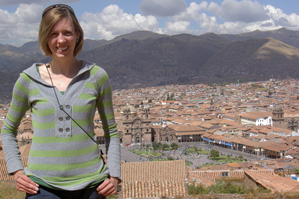Doctoral candidate receives $20,000 grant for research in Peru
Already an experienced hand at research in Central and South America, Maggie Remstad was fairly solid on the topic of her research for a dissertation. Now the education policy studies Ph.D. candidate is on very sure footing about how she’ll do it.
Indiana University Bloomington announced the first round of Mellon Innovating International Research and Teaching (MIIRT) program grants in January, and awarded Remstad a $20,000 short-term graduate student fellowship to go toward her project titled "A Human Rights Approach to Intercultural Bilingual Education in Peru." Remstad earned one of 18 funded projects at IUB as part of the initial MIIRT, a program funded by a $750,000 award from The Andrew W. Mellon Foundation. The money given to IU last year is intended to promote new directions in international and area studies.
“It is an honor and I’m fortunate to have the resources to carry out my project, which has been just an idea or a dream up to this point,” Remstad said. A former elementary classroom teacher with degrees in anthropology and elementary education, Remstad will conduct the project as the basis for her doctoral thesis. “I’ll be focusing on teachers and how they have implemented programs intended to promote human rights in the context ofintercultural, bilingual education,” she said. Peru’s teachers are tasked with carrying out a governmental policy of ensuring quality education for students who are not native Spanish speakers and are from homes that speak one of more than a hundred dialects stemming from around 15 language families. Remstad will focus her work on Quechua speaking communities in an Andean highland province. “My project focuses on teachers, in particular how they have been prepared to teach for linguistic and cultural inclusion and how they understand this concept of teaching in relation to education for human rights and democratic life,” she said.
Remstad became interested in the topic during a previous visit to Peru in the summer of 2010, when she studied Quechua for two months. It was her second trip to this region of Peru and she had already taught in neighboring Chile before. She became curious about how the educational system in Peru dealt with the many indigenous languages schoolchildren spoke.
“Over the past 15 to 20 years there has been a push towards not only bilingual education, but intercultural education to revitalize and valorize the presence of minority languages and cultures in the country,” Remstad said. “It’s been problematic because there is a shortage of teachers fully equipped in knowledge of indigenous languages. So there’s a problem of having the linguistic, pedagogical skills but also cultural knowledge of the communities. Often, teachers placed in rural schools are outsiders, so there’s both a linguistic and a cultural barrier.”
With the funding for her Peru research in line, Remstad is now completing her preparation before going to the country in July. She’ll already be more than halfway there by May; Remstad goes to the University of Costa Rica in May for two months as part of the Indiana University Graduate Student Exchange program organized through the IU Office of the Vice President for International Affairs. The work will expand her research experience in Latin America and build on her longstanding interest in using education policy to promote social good.
“My larger research interests in education have to do with how education reflects the values of society but also how it can be a progressive force for social change,” Remstad said. "I hope my research will help to illuminate the potential for education to redress social inequalities but also add greater understanding of the many challenges teachers face in implementing education policy in diverse contexts."
Remstad added that the grant funding is validation of not just her project but the importance and quality of ongoing international research at the IU School of Education. The Peru research is another project aimed at increasing global understanding in keeping with many efforts by School faculty, staff, and students. Current projects include rebuilding the educational system in Afghanistan, exchanges with teacher preparation institutions in China, as well as the award-winning Cultural Immersion Projects which place student teachers in 15 countries.
 Remstad during a previous visit to Peru.
Remstad during a previous visit to Peru.